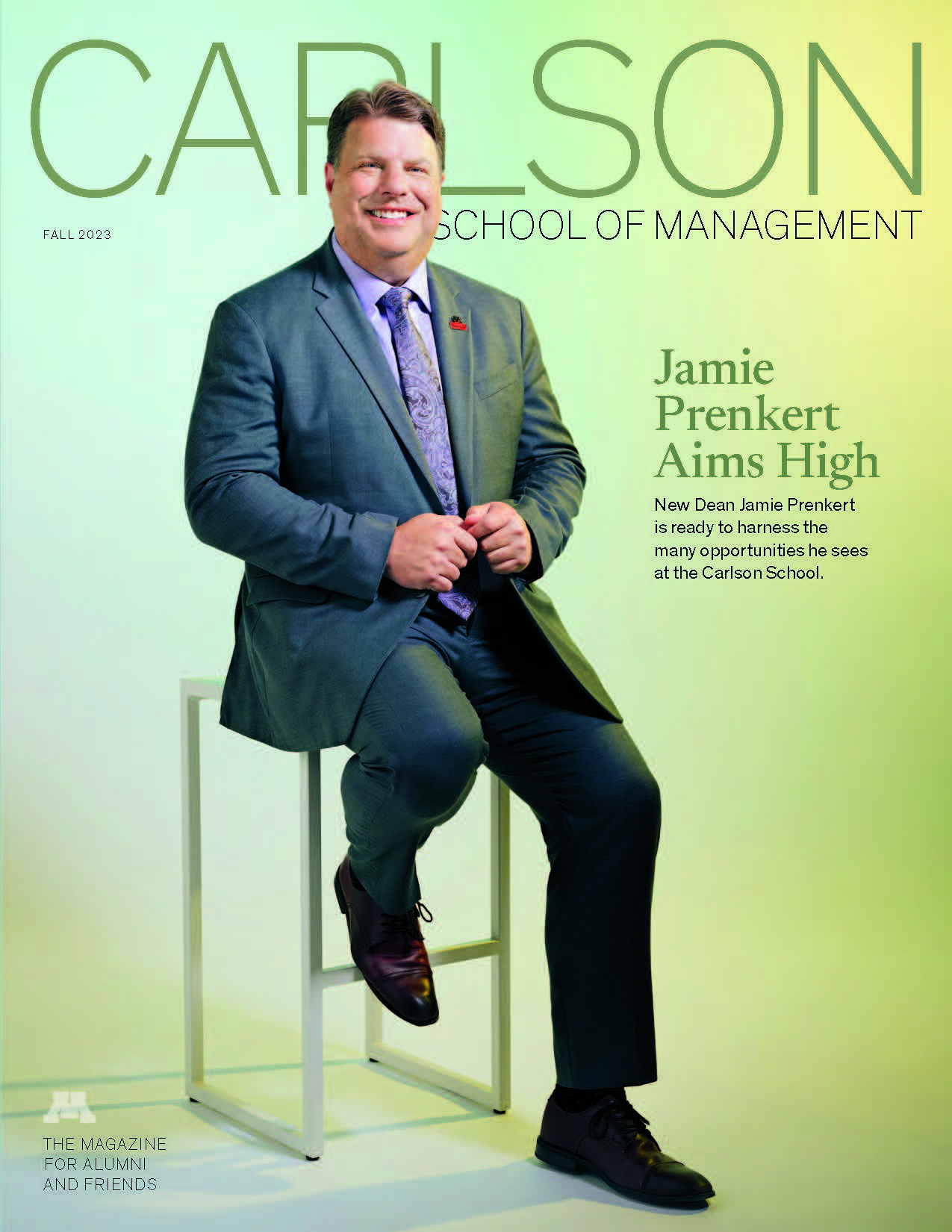
Can AI Help You Land a Job?
Friday, October 13, 2023
By Gene Rebeck
ChatGPT and other artificial intelligence tools can make job seeking easier—if you know how to use them.
Just four months ago, Lakshit Bajaj, ’23 MSBA, joined New Jersey–based software and data analytics company Axtria as a decision sciences project leader. While he credits his hiring primarily to his training and degree, Bajaj also received crucial help from artificial intelligence. Specifically, an AI-driven chatbot that has exploded on the scene since its launch in November of 2022.
To call ChatGPT a “chatbot” understates how astonishing its capabilities are. By “conversing” with it online through “prompts” that specify what you’re seeking, you not only can get answers and information—you also can have it help you write just about anything, even magazine articles (not that we did). Bajaj says he used ChatGPT to improve the existing language in his cover letters and résumés. “You can give it a prompt and ask it to fix the grammar or make it sound more professional or more enthusiastic,” he says.
There are other, similar AI-powered technologies out there, such as Google Bard and YouChat. But ChatGPT has rapidly emerged as a widely used tool for job seekers such as Bajaj.
“We have seen students use ChatGPT for everything from résumé and cover letter [support], [searching for] jobs to apply for, answers for potential interview questions,” says Maggie Tomas, executive director of the Carlson School’s Business Career Center (CBCC). This year, she says, “our team has tried to soak up as much knowledge as possible that’s out there.” The goal? “Give students best practices for using ChatGPT and things to avoid—because we know that they’re going to use it,” she says.
It isn’t just recent grads who can benefit from ChatGPT’s ever-evolving powers. But despite some of the scary predictions about AI, at this point, at least, it can’t replace the human factor—including those attributes that make you distinctive as a professional and a colleague.
With that in mind, here are some of the benefits and pitfalls of using ChatGPT in the job search.
Benefits
The technology is quickly improving.
One reason why ChatGPT has boomed: The more people use it, the more it learns and the better it gets. And AI isn’t completely new: For several years, the CBCC has been using a digital tool called VMock, which uses AI to review and evaluate résumés. For instance, Tomas notes, it can help determine how “compelling” résumés are.
It can help overcome writer’s block.
Cover letters “can feel like the heaviest thing for students to write,” Tomas says. Using ChatGPT speeds up the writing process, so there’s less time spent staring at a blank page and more time fine-tuning your message. As Bajaj discovered, ChatGPT can help come up with usable phrases for specific positions and employers. “You can also train it in the way you want your cover letter to look,” he says. Bajaj trained ChatGPT to create a version of his cover letter’s opening paragraph that expressed why he was interested in the company and how he could best use his skills. He believes the final product was better than what he had on his own.
You can specify your search more easily.
People have long been using Google for locating and investigating potential employers. But compared with that search engine, Tomas says working with ChatGPT “is like having a conversation.” As the user and the chatbot interact, “it will continue to filter. Whereas you might type a new query into Google, it will erase what you typed in before.” Bajaj says using ChatGPT is “like talking with a teacher or a friend. And you can ask clarifying questions about the links it gives.”
Despite some of the scary predictions about AI, it can’t replace the human factor—including those attributes that make you distinctive as a professional and a colleague.
Pitfalls
"The output is only as good as the input,"
says Will O’Brien, the CBCC’s associate director. Simply asking for “a good cover letter” won’t get you very far. ChatGPT needs specific prompts to deliver the best results.
ChatGPT doesn't provide an authentic voice.
It’s artificial intelligence, after all. Ask it to generate even a highly specified cover letter, and “it will come up with something that doesn’t quite sound human—or it sounds like someone else wrote it,” Tomas says. Bajaj noticed this himself, finding that in ChatGPT-generated text, he had to modify the language to make it sound more like himself. That said, he says he found it didn’t take long to make those fixes.
ChatGPT can't be used on its own for doing research.
For one thing, the information it gathers from its digital sources isn’t always reliable. “You can’t take [ChatGPT] as a source of truth,” Bajaj says. You need to cross-check. “We have heard worst-case scenarios from recruiters where a student had ChatGPT write a résumé,” Tomas says. “Then the hiring manager asked questions about what was on the résumé and the student wasn’t able to answer them very well. We won’t let that happen to our students.” In other words, AI should always be supplemented with non-AI resources. O’Brien advises job seekers to “leverage AI tools.” For example they could ask ChatGPT to search for Carlson School alumni working at a specific company. Then, “they can pop over to LinkedIn and search for those same names” to build connections.
Like AI in general, O’Brien and his colleagues in career guidance and coaching are still learning—about ChatGPT and how to help job seekers make the best use of it. One thing it (probably) will never be able to do: take the place of a career counselor. Or, for that matter, of a job seeker.



